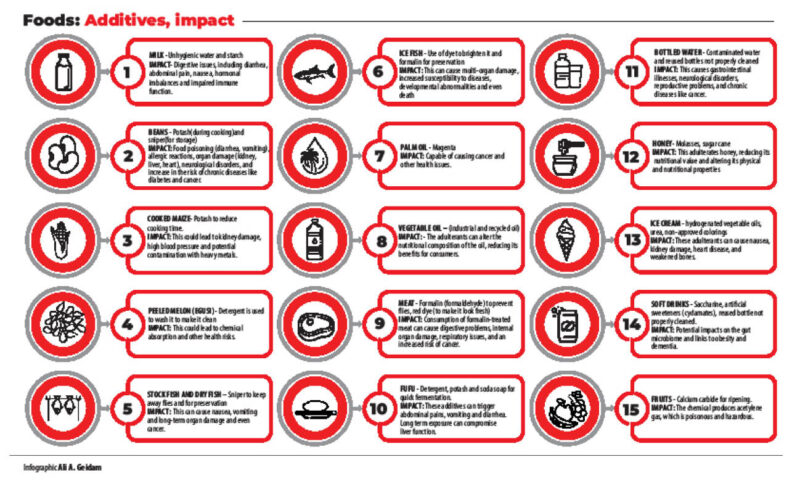Gbenga (surname withheld) and three other students complained of stomach pain after eating food from a vendor on the school premises in the Kubwa area of the Federal Capital Territory (FCT). They collapsed and were hospitalised. Doctors traced the case to the palm oil used to cook the food being contaminated.
“Since then, I have not bought food from the woman. I don’t know about others,” he said.
Maureen Onche bought stew from a roadside vendor, left it briefly at the office and collected it when she closed for the day. At home, she prepared white rice and ate a few spoonfuls of the stew before developing abdominal pain.
SPONSOR AD
“At first, I thought the mild stomach pains were nothing serious and kept eating, but the pain worsened until it became unbearable. I tried to force myself vomit, but only water came up,” Onche told Weekend Trust.
Panicky, she ran to a nearby hospital, where she was told that the stew was poisoned.
“I could have died. I was kept under observation at the hospital and advised to seek further medical care. Later, I discovered that the oil used by the vendor to make the stew was adulterated,” she said.
Grace Owu also shared her experience with adulterated water during her three-week stay at an NYSC camp in a state in the North East.
She said: “When I was at NYSC camp two years ago, I noticed that I was constantly falling sick. I kept experiencing bouts of vomiting, stomach pain and general weakness. I initially thought it was just the stress of camp activities, but the illness became frequent and unbearable.
“Eventually, I went to the camp clinic. After explaining my symptoms and undergoing some checks, the doctor diagnosed me as reacting to the water I had been drinking.
“He explained that the sachet water being sold and shared around the camp was not clean and might have been adulterated.
“The doctor advised me to stop drinking sachet water and switch to bottled water instead. He also prescribed some medication to help manage the stomach upset and restore my health. After following his instructions, I gradually started feeling better.
“That experience opened my eyes to the dangers of adulterated water. Something as simple as drinking water, which should give life and refreshment, became the source of my illness.
“Since then, I have been careful about the kind of water I consume, always making sure it is clean and properly sealed.”
Isa Mukaila, a bachelor, bought beans and cooked. After consumption, he complained of stomach ache. When he visited the hospital, doctors ran a check on him and discovered that it was contaminated.
Also, Enoch Julius, a fresh graduate, bought a non-alcoholic wine from a supermarket to celebrate his graduation from the Federal Polytechnic, Bida, Niger State. Unknown to him, the wine was fake. He was later diagnosed with liver disease.
Ezra Onyema, a journalist, told Weekend Trust that two of his children had issues with their health, and after several checks, it was discovered that the type of water they consumed was the cause.
“Doctors then advised us to stick to a particular bottled water. At least for now, it is safe for them – no complications since then,” Onyema said.
According to the World Health Organisation (WHO), food adulteration is the intentional inclusion of forbidden substances to partially or completely substitute healthy ingredients in a food product or to falsely enhance the value of fresh products.
This practice poses serious risks as it can introduce harmful substances or strip food of vital nutrients, endangering both health and nutrition.
In February, the Kano State Government threatened legal action against traders involved in food adulteration. This resulted in a series of arrests at the Dawanau International Grains Market in the state.
The Commissioner for Commerce, Investment and Industry, Alhaji Shehu Wada Sagagi, who lamented the severity of food adulteration, emphasised that such illicit practices “threaten the image and age-long integrity of the market. It also causes damage to the state’s reputation in the global commodity trade.”
Earlier this month, the federal government warned those involved in food adulteration and forced ripening of fruits in markets to desist from such act or face the wrath of the law.
Speaking while addressing market women during a one-day sensitisation programme titled: “Forced Ripening of Fruits, Adulterated Palm Oil, Contaminated Meat and Grains” in Uyo, Akwa Ibom State, the executive vice chairman of the Federal Competition and Consumer Protection Commission (FCCPC), Mr Olatunji Bello, explained that the commission, being the apex consumer protection body in Nigeria, had the statutory mandate to promote consumer interests to ensure fair market practices and prevent dangerous conduct in all sectors of the economy, including agricultural sector.
Represented by the Director of Quality Assurance and Development, Dr Nkechi Mba, in the commission, Bello said: “Let it be known that any operator who places profit over quality will face the full wrath of the law. To the food industry stakeholders: Note that the future of your businesses depends on your integrity. Upholding food safety and quality is not only a legal obligation but a moral duty.”
While urging consumers to be knowledgeable and vigilant, informed and always demand the standard deserved, he added that sensitisation exercise offered a platform to inform, educate and empower both consumers and industry stakeholders to foster greater awareness on the importance of proper food handling, labelling, regulatory compliance and ethical conduct in the market place.
Instances of food adulteration
A common case is the dilution of milk with water. While it may appear harmless, experts say this practice reduces the milk’s nutritional content and can cause health problems, particularly in children.
Potash, known as “kaun” or “Kanwa” in West Africa, is a traditional ingredient used to soften beans quickly by increasing the cooking rate and improving texture. While effective, its use is controversial due to potential health risks, including links to high blood pressure and kidney problems as it is unregulated and can contain impurities like heavy metals.
Sniper, a highly toxic pesticide being sprayed directly on stockfish, dried fish and grains, is also very harmful. A recent video which circulated on the social media showing its use raised public concern and ignited discussions about the possible health risks linked to the improper handling of such toxic substances.
Similarly, Weekend Trust gathered that palm oil is often mixed with magenta, a deep red-like dye, to improve its coloration.
On vegetable oil, it was discovered from observation and interviews with traders that common adulterants include industrial oil, recycled oil or other less expensive oils like soybean oil or mineral oil blended into high-value oils like olive or mustard oil.
Butchers and food sellers are also culprits. They sometime use formalin (a chemical widely known for preserving corpses) to preserve meat and keep flies away, which extends its shelf life but poses serious health risks, including cancer.
Ice creams are also contaminated with harmful substances, such as detergent, phosphoric acid, urea and starch used to achieve a desired texture.
Some producers of sachet and bottled water are involved too. Weekend Trust gathered that they sometime pick used plastic bottles, which they fill with contaminated water fetched from a paint bucket while using dirty rubber funnel covered with clothing material as filter.
Many types of drinks are also adulterated. Examples include beverages, soft drinks and other consumables like honey and ketchup.
Why we adulterate our food products – Traders
In separate chats with Weekend Trust, traders openly admitted to adulterating their products.
A butcher who simply identified himself as Tijjani, admitted to using formalin to keep his beef looking fresh for buyers. He explained that the practice had become a “necessary evil” for many in the business.
“Honestly, if I don’t treat the meat, it will spoil before evening. As you know, customers want fresh-looking beef, not something brown and smelly. If the meat changes colour, people walk past my stall without even asking for the price,” he said.
According to Tijjani, the harsh heat in Abuja worsens the problem, causing beef to decompose faster, especially in markets where there is little or no refrigeration.
“I know formalin is not for food, but without it, I will lose money. People don’t buy meat that looks old. They want bright red beef, and if you can’t give them that, you can’t survive in this trade,” he said.
The butcher added that many of his colleagues also rely on similar methods, insisting that without them, “half of the meat in this market would end up in the dustbin every day.”
Madam Ada, a vegetable trader in Abuja, admitted to using pesticides to keep her produce attractive for buyers.
Standing behind her stall stacked with neatly arranged bundles of leaves, she explained that market pressure often forced traders into such practices.
“Vegetables wilt quickly, especially during heat. Once the leaves start turning yellow or looking soft, nobody will buy them. Customers avoid them like they are already spoiled,” she said.
To meet those expectations, she confessed to sprinkling pesticides (the same chemicals used on the farm) directly onto the leaves to maintain a fresh, green appearance.
“We sprinkle some of the chemicals we use on the farm to keep them looking fresh.
“I know it is not healthy, but people want beauty, not truth. If I sell them the way they come from the farm, many will reject them and I will go home with losses. If the pesticides can be used on the farm, I don’t see why I can’t apply it,” she said in a low tone.
Speaking on condition of anonymity, a fish seller who uses dye to brighten fish, said: “The fish sometimes comes in almost spoilt. If I wash it with dye and chemicals, it looks shiny like it just came from the river.
“Nigerians only buy what looks fresh, so we do what we must. If I don’t, I will be running at a loss.”
A food vendor in Ado-Ekiti, Labake Adetunji, said she started adding potash while cooking beans after she leant about its nutritional value. She said she never knew about its side effect on the body.
“Someone made me to understand that apart from making beans get soft fast, it aids in digestion by promoting the breakdown of food in the stomach. I did not know that it has side effect,” she said.
Also, a palm oil dealer in Bida, Niger State, who mixes oil with colouring agents, said pure palm oil was too expensive.
“Frankly speaking, pure palm oil is too expensive. A lot of customers complain when the price is high. I mix in a little dye or other oil.
“The red colour makes it look even better than the natural one. They are happy with the price; I make small profit,” she said.
Mama Sadiya, a beans cake seller, said she always reused her frying oil.
She said, “It is no longer news that fresh oil is costly. If I change it on a daily basis, I won’t gain, so I keep using the same oil for days, just topping it up. As long as it fries the akara, customers don’t notice. They only complain if the price of the food is high.”
A woman who runs an egusi-peeling business with the aid of an industrial machine revealed to our reporter that detergent is sometimes used in processing the popular melon seeds consumed across Nigeria.
The woman, who pleaded anonymity, explained that the process begins with soaking the egusi in water for about 20 minutes before peeling off the back with a machine. After peeling, the seeds are washed with a detergent to make them look cleaner and whiter before being dried in the sun and packaged for sale.
“The reason we wash it with detergent is that if customers want to buy and they see the egusi is not clean or white, they won’t patronise us. Even customers who bring their egusi for peeling usually complain if the seeds are not white. So we must make it look good,” she said, adding that she does not see anything wrong with the use of detergent since the seeds are dried before packaging.
“We have been doing it for a long time; that is the procedure we follow,” she said.
Checks by Weekend Trust showed that chemicals such as detergent, potash, and soda soap are often added to fufu, a popular meal amongst Nigerians and prepared from pounded cassava) during preparation to speed up the softening process.
Researchers at the University of Lagos have raised concerns over the use of harmful chemicals in the processing of fufu, warning that the practice poses severe health dangers to consumers.
The study revealed that fufu prepared with these additives contained toxic compounds that significantly raise the risk of gastrointestinal problems, liver injury, and even cancer.
Laboratory analysis comparing samples produced with and without the chemicals confirmed that their presence was strongly linked to these health concerns.
The report noted that consuming chemically processed fufu could trigger abdominal pain, nausea, vomiting and diarrhoea, which in extreme cases may require hospital care. The researchers cautioned that long-term exposure could compromise liver function and heighten the chances of developing chronic illnesses, including cancer.
Supporting evidence from a separate study by the US-based National Institutes of Health also highlighted the dangers of using detergents in cassava processing.
Tests carried out on Wistar rats revealed damage to kidney tissues, prompting researchers to recommend an outright ban on the practice and stricter enforcement by regulatory agencies.
NAFDAC speaks on adulterated fruits, palm oil
Speaking during a one-day sensitisation programme on food quality standards, safety, regulation and fair business practices in Enugu, the Director-General of the National Agency for Food and Drug Administration and Control (NAFDAC), Professor Moji Shola Adeyeye, represented by Dr Leonard Omokpariola, warned against the use of calcium carbide in ripening fruits.
“Calcium carbide produces acetylene gas, which is poisonous and hazardous. It only mimics natural ripening agents, making fruit appear yellow on the outside without proper maturity. Anyone who eats such fruit risks severe health complications,” she said.
The agency also expressed concern over the sale of adulterated palm oil in Minna, the Niger State capital.
Kenneth Azikiwe, a pharmacist and zonal director of NAFDAC, North-Central, described the practice as harmful to public health and damaging to the country’s economy.
Addressing journalists shortly after a stakeholders’ engagement meeting in Minna, Azikiwe said, “This act is carried out by marketers at night and it is most unfortunate. The agency will not spare anyone caught in the practice.”
According to him, some traders add chemicals to palm oil to make it appear more reddish and attractive, warning that such adulteration poses serious health risks to consumers.
“The addition of chemicals to palm oil to make it attractive is a dangerous marketing practice; and this must stop immediately,” he said.
Doctors, nutritionists dissect
Various medical experts, including nutritionists, who were approached by Weekend Trust for comments, warned that the practice not only compromised food quality but also increased the risk of diseases and malnutrition.
Dr Folarin Ogundele, a clinical nutritionist, described food adulteration as one of the biggest hidden dangers facing Nigerians.
He said, “A lot of people don’t realise that the palm oil they buy in markets might be coloured with industrial dyes, or that the milk powder could be mixed with fillers that have no nutritional value.
“These practices cause cumulative damage to the body. They stress the liver and kidneys, leading to organ failure in the long run,” he said.
According to him, adulteration doesn’t just reduce food quality but also undermines efforts to fight malnutrition.
“If people consume foods that are stripped of nutrients or contaminated with harmful agents, you are creating a population that looks fed but is actually undernourished. That is a silent epidemic,” he added.
Mr George Chukwuma, another nutritionist, said Nigerians often underestimated how deeply adulterated foods affect everyday health.
“Imagine consuming bread that contains bleaching agents or cereals bulked up with unsafe starches – the body is forced to fight toxins rather than absorb nutrients. The result is fatigue, frequent illnesses and a weakened immune system,” Chukwuma explained.
Emphasizing that public awareness is still very low, he said, “Most Nigerians judge food by price and colour. A bright red palm oil, for example, might look attractive but could be laced with Sudan dye, which is carcinogenic. Without consumer education and stricter monitoring, people will continue to fall sick without linking their illnesses to what they are eating.”
Mrs Hassana Kabiru, a child nutrition specialist, said children were the most at risk from complications.
She said: “Children are mostly at risk because their digestive and metabolic systems are not as mature as adults. Therefore, consuming contaminated foods affects them more severely.
“They suffer from stunted growth, reduced cognitive development and even behavioral issues caused by toxic exposure.
“The outcome of raising children who are malnourished or chronically ill due to adulterated foods is not always nice. The country pays the price in reduced productivity, higher health care cost and a weakened workforce. This is not just a health issue, it is a developmental crisis,” he noted.
Dr Michael Olayiwola, a consultant physician said: “Hospitals in Nigeria have been witnessing the clinical fallout of adulterated foods. We see patients with liver disease, kidney failure, gastrointestinal cancers and metabolic disorders. When their lifestyle habits are looked into, many of these conditions are linked to poor food quality and contamination.”
Olayiwola noted that adulteration doesn’t always kill immediately, which is why it’s so dangerous.
“The damage is slow, silent and progressive. People consume these foods for years until suddenly, they face life-threatening illnesses. That is why enforcement and regulation are critical,” he said.
‘Adulterated food is poison’
Jeremiah Atah, a medical doctor said, “The tragedy of food adulteration is that it often goes unreported until it leads to large-scale poisoning. Every day, small doses of toxic substances are weakening people’s systems. That’s why it is called a silent killer.”
Warning that the crisis also undermines trust in local food systems he said, “If citizens cannot trust the safety of the food in their markets, they will turn to expensive imports. That has direct economic consequences. The government must make food safety a top priority because food is medicine but adulterated food is poison,” he said.
Musa Ibrahim, a dietitian, said unsafe food was a major driver of diseases, malnutrition and food insecurity across Nigeria and the continent, adding that food safety is a critical but often overlooked factor in nutrition.
“One of the reasons food consumed is not properly utilised by the body is because it is unsafe.
“When food is contaminated, instead of nourishing, it becomes a source of illness, creating a vicious cycle that worsens malnutrition and food insecurity,” he said.
According to him, food can only be regarded as safe when it is free from physical, chemical and biological contaminants at every stage of storage, processing, transportation, preparation and consumption.
He further highlighted common sources of contamination, pointing to pathogens, such as bacteria and fungi, as well as exposure to rodents, insecticides and other harmful agents.
Ibrahim stressed that ensuring food safety requires collective responsibility, ranging from improved regulatory oversight to better handling practices by producers, vendors and consumers.








